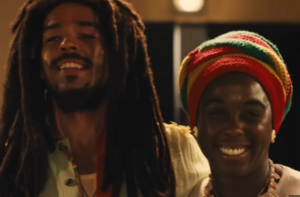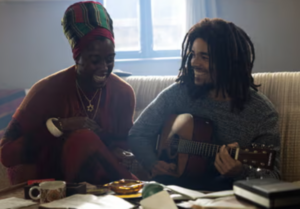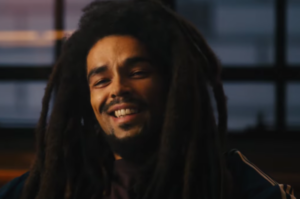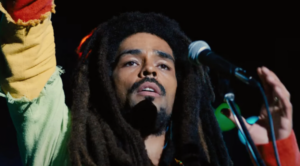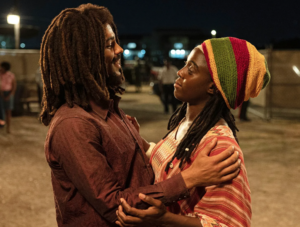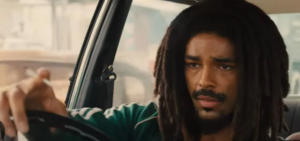Directed by Reinaldo Marcus Green | Written by Green, Terence Winter, Frank E. Flowers, and Zach Baylin | 104 min | ▲▲▲△△
I call it biopic-itis. The biographical pictures genre is so in love with conventions, especially the musical biopic subset, it tends to get locked into a highly predictable collection of plot developments, dramatic scenes, and rote, obvious dialogue. I’m sorry to say, Bob Marley: One Love, is deeply ensnared in biopic-itis. At the same time it has a few good things going for it: the costuming and notes of the era are solid, the two lead performances compel, especially Lashana Lynch, and the undeniable power in the music.
Here’s the thing: if these musical biopics are made with the consultation of the musician, their family or estate, then you tend to get an official hagiography — the hard edges get softened. This is a Tuff Gong production, with multiple members of the Marley clan claiming producer credits.
But if the movie is made without the agreement of the artist, you might get something unexpected, but you don’t get to use the songs. It’s a lose-lose situation.
Only a handful of these kinds of movies really do justice to their subjects, or approach them from an interesting angle. I didn’t love Priscilla, but I appreciated the angle, and the lack of Elvis on the soundtrack was no problem. Otherwise, go watch What’s Love Got To Do With It, Sid And Nancy, or La Vie En Rose to see how it can be done well. Or maybe even Weird: The Al Yankovic Story.
So, let’s get the trouble spots in Bob Marley: One Love out of the way first, before ladling out the praise.
Bob Marley: One Love tells the story of the beloved reggae icon from mid-career, 1976, when Marley (Kingsley Ben-Adir) was caught up in political strife in Jamaica — which is only barely explained — and was forced to decamp to London after having been shot at, while sending his wife, Rita (Lynch), off to the United States with the (many) kids. Why they couldn’t come with him to London isn’t particularly clear.
In London with his band, the Wailers, and the help of Island Records owner Chris Blackwell (James Norton), Marley sets out to record a new album, one with more intensity than before now that he’s been exposed to the punk and politics of the UK — we get a fun-if-perhaps-unlikely scene of Bob attending a Clash concert. That album is Exodus.
This is a film overstuffed with detail and event — another issue with biopic-itis is when the filmmakers try to be comprehensive to a fault. Here we get flashbacks, we get dream sequences, we get an explainer of Rastafarianism, we get Bob’s arguments with Rita, we get just the suggestion of his being a serial cheater, even violent, and we get those awkward Bohemian Rhapsody-esque scenes in the studio where the band struggles to agree on a direction.
In an effort to cover so much, it can’t help but feel unfocused and cheesy, with genuine moments of character restricted to only the two leads despite the sprawling ensemble. The script is clumsy and obvious in ways that bring the whole production down.
But here’s what works: the gorgeous costumes and location work convince as the late-’70s, and the actors have committed to the Jamaica Patois to the point where the film demands we lean in to really understand what’s being said.
Could director Reinaldo Marcus Green have offered a more creative, indie-movie aesthetic, and peeled away some of the visual gloss? Absolutely. Could he (and his writing collaborators) restricted the film to only Bob’s exile in London, and dug down on the recording of Exodus and his creative connection with the band? That might’ve worked a lot better. The scene of the Wailers piecing together the song, “Exodus,” is a genuine highlight. More of that would’ve been welcome.
Ben-Adir is convincing as Marley, though he’s written with a saintly hue without nearly enough of the contradictions that make him genuinely interesting.
He goes from laid back and peace-loving to embracing his role as a prophet, but the vulnerability, the jealousy, the things that make him human, those elements feel like an after-thought, something to be touched on before he achieves his ultimate goals. As a man on a journey, he’s never fully fledged.
As Rita, Lynch is amazing. She sees the talent in her husband and is willing to sacrifice a lot for him, but not all her ambition for herself. The camera on her face as she witnesses his deceit and his dreaming is everything.
At the end of the day, it’s the music that makes this watchable, and the music is superb, banger after banger. Ben-Adir is credited as singing on multiple songs, and his voice is terrific, though he may be digitally grafted with the original. Either way, it’s seamless. The filmmakers know that every three or four minutes they’ve got to bring another classic to bear, from “Simmer Down” all the way to “Redemption Song.”
It’s the music that’s the real and best reason to see Bob Marley: One Love.








